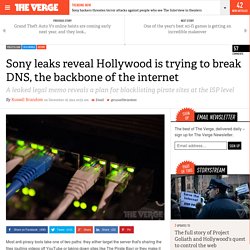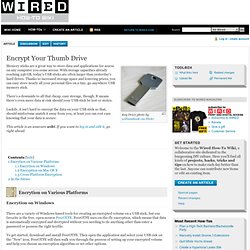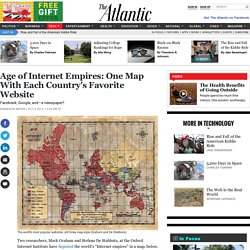

Sony leaks reveal Hollywood is trying to break DNS, the backbone of the internet. Most anti-piracy tools take one of two paths: they either target the server that's sharing the files (pulling videos off YouTube or taking down sites like The Pirate Bay) or they make it harder to find (delisting offshore sites that share infringing content).

But leaked documents reveal a frightening line of attack that's currently being considered by the MPAA: What if you simply erased any record that the site was there in the first place? A bold challenge to the basic engineering of the internet To do that, the MPAA's lawyers would target the Domain Name System (DNS) that directs traffic across the internet. The tactic was first proposed as part of the Stop Online Piracy Act (SOPA) in 2011, but three years after the law failed in Congress, the MPAA has been looking for legal justification for the practice in existing law and working with ISPs like Comcast to examine how a system might work technically. There are still serious technical problems with the approach. Secularizing the Tech Debate. Secularizing the Tech Debate Jaron Lanier (ALA/Flickr Commons) Who Owns the Future?

By Jaron Lanier Simon & Schuster, 2013, 396 pp. To Save Everything, Click Here: The Folly of Technological Solutionism by Evgeny Morozov Public Affairs, 2013, 415 pp. According to two recent books, many people today believe in the Internet the way that the denizens of the Age of Faith believed in God, or that many on the left once believed in Marxism: as the exclusive source of universal personal and political salvation and the basic organizing principle of history. The celebrated cause of “Internet freedom,” Lanier and Morozov tell us, is about the freedom of data, not people, and strengthens the hand of a small elite positioned to profit from that data. The similarities between Morozov and Lanier end there. Morozov describes “the Internet” as a “socially constructed concept” whose “various parts” must “be studied in their own right.”
Geoff Shullenberger is a teacher and writer based in Monterey, California. Encrypt Your Thumb Drive. From Wired How-To Wiki Memory sticks are a great way to store data and applications for access on any computer you come across.

With storage capacities already reaching 256 GB, today's USB sticks are often larger than yesterday's hard drives. Thanks to increased storage space and lowering prices, you can easy store nearly all your personal files on a tiny, go-anywhere USB memory stick. There's a downside to all that cheap, easy storage, though. It means there's even more data at risk should your USB stick be lost or stolen. Luckily, it isn't hard to encrypt the data on your USB stick so that, should misfortune snatch it away from you, at least you can rest easy knowing that your data is secure. This article is an unsecure wiki. Encrytion on Various Platforms Encrytion on Windows There are a variety of Windows-based tools for creating an encrypted volume on a USB stick, but our favorite is the free, open-source FreeOTFE. To get started, download and install FreeOTFE.
Encryption on Mac OS X. Age of Internet Empires: One Map With Each Country's Favorite Website - Robinson Meyer. Two researchers, Mark Graham and Stefano De Stabbata, at the Oxford Internet Institute have depicted the world’s “Internet empires” in a map, below.

The map shows each nation’s most popular website, with the size of nations altered to reflect the number of Internet users there. The map makes for a brief, informative look at how geographic—and universal—certain web tastes and habits are. Facebook, the world’s most popular site, is most popular in North Africa, parts of the Middle East, and the Pacific coast of South America. But elsewhere, Google looms. It’s the most popular website in North America, Europe, and parts of south Asia.
And even where it isn’t the most popular site, Google is still powerful. Among the 50 countries that have Facebook listed as the most visited visited website, 36 of them have Google as the second most visited, and the remaining 14 countries list YouTube (currently owned by Google). My Technology, My Self.